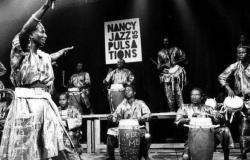Features
- Titre : Cross the mountains and come to be born here
- Auteur : Marie Pavlenko
- Editor : Stopovers
- Collection : French Domain
- Release date in bookstores : August 22, 2024
- Digital format available : oui
- Name of pages : 352
- Prix : 21€
- Acheter : Click here
- Note : 8/10 par 1 critique
★★★★★
★★★★★
Initially known for her children’s and adolescent novels (I am your sunTatoulu Prize 2018, Such a little birdBabelio Young Adult Prize 2019), Marie Pavlenko returns this year with her third adult novel, Cross the mountains and come to be born here, published by Les Escales.
Two women tormented by life
Astrid, in her forties, is broken by life. A terrible bereavement has just struck her, and she chooses to isolate herself in a house in the heart of the Mercantour mountains. For her part, Soraya, a 17-year-old Syrian girl, flees her native country to find refuge in Europe. The paths of these two women broken by life will intertwine until a chance meeting, one day of heavy snow, which will change the destiny of both.
Marie Pavlenko paints a subtle and poignant portrait of two lonely souls, in distress, who will try to unite their solitudes and ease their suffering. Their stories are first alternated before intertwining, nevertheless allowing the point of view of one then the other to be expressed. The two women are haunted by their memories, and numerous incises plunge the reader directly into their past, into the heart of these brief and painful reminiscences.
Sensitivity and poetry
In Cross the mountains and come to be born hereMarie Pavlenko once again demonstrates the finesse and poetry of her pen. The construction of sentences is worked on, deconstructed, often choosing juxtaposition, noun phrases or the strange association of two words to make them resonate and give them more weight. The pace is slow, without being boring, and the writing is full of sensitivity, striving to transcribe sensations and emotions as precisely as possible.
In her novel, Marie Pavlenko gives pride of place to nature. A nature that is sometimes hostile and brutal, sometimes reassuring, capable of calming and healing. Astrid and Soraya are cut off from time and the world, immersed in this impassive and immutable setting. This parenthesis granted to the protagonists is also a time conducive to poetry. Each chapter begins with a brief extract from a poem. Andrée Chedid, Emily Dickinson and Mahmoud Darwich are called upon in turn to accompany the moods of the protagonists and their evolution over the pages.
Between reflection and compassion
Despite these pranks on the side of nature writing and poetry, Marie Pavlenko’s story is far from being solely contemplative. It tells of the hell of migration, the deplorable and dangerous travel conditions, the injustice and the fear. The author talks about the shock of cultures, non-consensual motherhood, or even resilience in the face of life’s trials. So many subjects that could have been treated with too much good feeling or pathos, but which she manages to approach with finesse and intensity.
This success does not make reading the novel any less difficult. Marie Pavlenko does not shy away from the brutality of the tragic destinies of Astrid and Soraya, and sometimes describes in a crude manner the reality of their ordeal. She denounces, protests and supports the two women in their revolting and cruel fate, while offering a salutary message of tolerance and solidarity.
Cross the mountains and come to be born here is therefore a sensitive and intense novel, sometimes tragic, sometimes luminous. Addressing mourning, the horrors of war and sisterhood, it once again demonstrates the poetic and evocative power of Marie Pavlenko’s pen.

![[Critique Livre] Cross the mountains and come to be born here](https://euro.dayfr.com/temp/resized/medium_2024-10-08-5dde4f03de.jpg)




